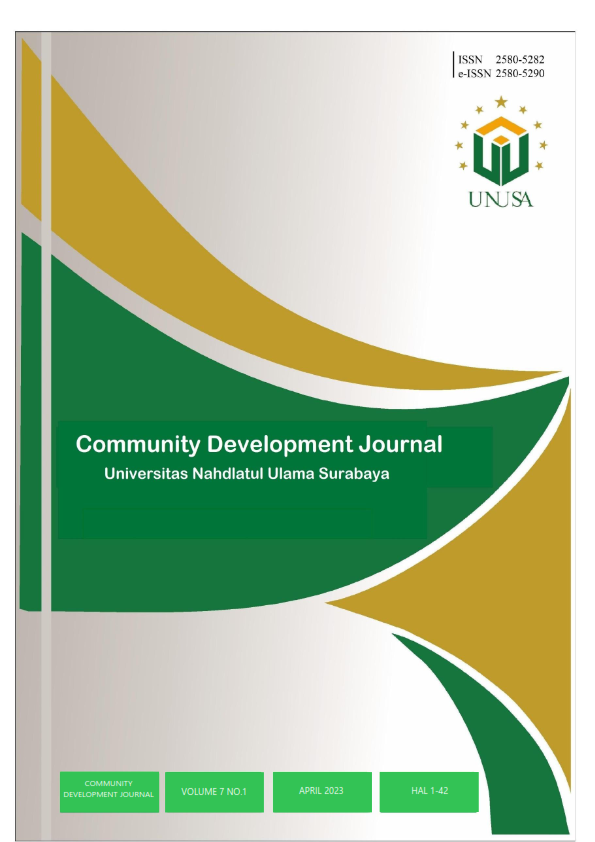Empowerment Teachers of SMA Malang Raya Making Eco Enzyme and Biology Module for Teachers of SMA Malang Raya
##plugins.themes.bootstrap3.article.main##
Abstract
The 21st century is characterized by information that can be accessed by anyone, anytime and anywhere, computing or using robots, automation or work that can be done regularly and communication that becomes unlimited. Educators are required to be able to facilitate and inspire student learning and creativity, such as involving students in exploring real-world issues and solving contextual problems using tools and digital resources. Learning in the form of environmental care needs to be related to the application in students' daily lives in the family, community, and surrounding nature, so that learning becomes meaningful for students. Eco-enzyme is one of the sources and learning media in the surrounding environment that can be raised in the learning process. This can be used as a teaching module that teachers use as innovation. This activity aims to hold eco-enzyme training and the preparation of teaching modules for Biology Teachers of Malang Raya High School. This activity is carried out using the eco-enzym making training method and the preparation of teaching module making exercises by lifting eco-enzymes. The targets of this activity are teachers from malang city and malang district with 15 of them. The results of this activity found that 80% of this activity was successful because it exceeded the target with details of 18 attending offline and 5 attending online. Another thing is shown by the collection of 6 teaching modules.
Downloads
##plugins.themes.bootstrap3.article.details##
Copyright (c) 2023 Balqis Balqis, Herawati Susilo, Murni Saptasari3, Sitoresmi Prabaningtyas4, Ringga Satria Putra, Iin Lailatul Khoirunnisa, , Rifqi Hilman

This work is licensed under a Creative Commons Attribution-ShareAlike 4.0 International License.
References
Aasen, W., & Sadownik, A. R. (2019). Does the New Kindergarten Teacher Education Program in Norway Provide Good Conditions for Professional Kindergarten Teachers? 7, 1–7. https://doi.org/10.13189/ujer.2019.071301. DOI: https://doi.org/10.13189/ujer.2019.071301
Agustina Monalisa Tangapo & Febby Kandou. 2022. Edukasi Pemanfaatan Eco-Enzim Hasil Fermentasi Sampah Organik Rumah Tangga Menjadi Hand-Sanitizer di Kelurahan Meras Manado. The Studies of Social Science 04(01): 1-9. DOI: https://doi.org/10.35801/tsss.2022.4.1.38901
Andina, Elga. 2019. Analisis Perilaku Pemilahan Sampah di Kota Surabaya. Aspirasi: Jurnal Masalah-Masalah Sosial, Volume 10, No. 2. DOI: https://doi.org/10.46807/aspirasi.v10i2.1424
Effendy, I. (2016). Pengaruh Pemberian Pre-Test dan Post-Test Terhadap Hasil Belajar Mata Diklat HDW.DEV.100.2.a pada Siswa SMK Negeri 2 Lubuk Basung. Jurnal Ilmiah Pendidikan, 1(2), 81–88.
Ferdinandus, B., S., & Desak, M., A. (2018). Inovasi Pembelajaran Elektronik dan Tantangan Guru Abad 21. Jurnal Penelitian dan Pengkajian Ilmu Pendidikan: e-Saintika, 2(1), 10-18. DOI: https://doi.org/10.36312/e-saintika.v2i1.79
Ghozali, A. E., Darma Setiawan, B., & Tanzil Furqon, M. (2017). Aplikasi Perencanaan Wisata di Malang Raya dengan Algoritma Greedy. Jurnal Pengembangan Teknologi Informasi Dan Ilmu Komputer, 1(12), 1459–1467.
Junedi, B., Mahuda, I., & Kusuma, J. W. (2020). Optimalisasi keterampilan pembelajaran abad 21 dalam proses pembelajaran pada Guru MTs Massaratul Mut’allimin Banten. Transformasi: Jurnal Pengabdian Masyarakat, 16(1), 63–72. DOI: https://doi.org/10.20414/transformasi.v16i1.1963
Nesri, F. D. P., & Kristanto, Y. D. (2020). Pengembangan Modul Ajar Berbantuan Teknologi Untuk Mengembangkan Kecakapan Abad 21 Siswa. AKSIOMA: Jurnal Program Studi Pendidikan Matematika, 9 (3), 480-492. DOI: https://doi.org/10.24127/ajpm.v9i3.2925
Nurdyansyah, N. (2018). Pengembangan Bahan Ajar Modul Ilmu Pengetahuan Alam Bagi Siswa Kelas IV Sekolah Dasar. Universitas Muhammadiyah Sidoarjo.
Seidman, E., Kim, S., Raza, M., Ishihara, M., & Halpin, P. F. (2018). Assessment of pedagogical practices and processes in low and middle income countries: Findings from secondary school classrooms in Uganda. Teaching and Teacher Education, 71, 283– 296. https://doi.org/10.1016/j.tate.2017.12.017. DOI: https://doi.org/10.1016/j.tate.2017.12.017
Sungkono, S. (2009). "Pengembangan dan Pemanfaatan Bahan Ajar Modul Dalam Proses Pembelajaran." Majalah Ilmiah Pembelajaran, 5 (1), 78.
Zubaidah, S. (2019). Pendidikan Karakter Terintegrasi Keterampilan Abad Ke-21. Jurnal Penelitian Dan Pengkajian Ilmu Pendidikan: E-Saintika, 3(2), 1. https://doi.org/10.36312/e-saintika.v3i2.125. DOI: https://doi.org/10.36312/e-saintika.v3i2.125

